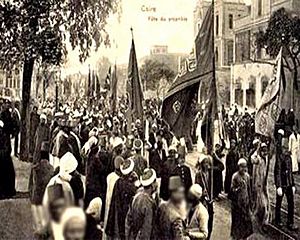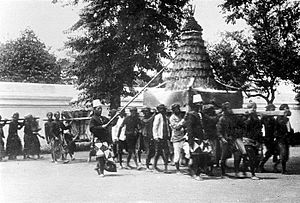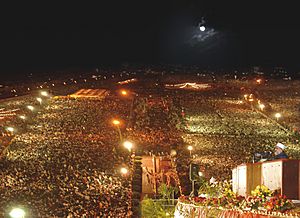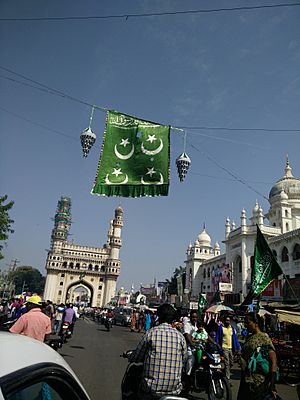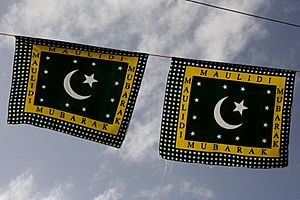Mawlid facts for kids
Quick facts for kids Mawlid |
|
|---|---|
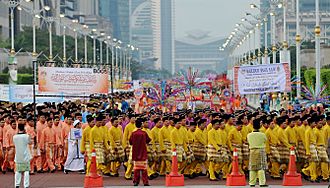
Malaysian Sunni Muslims in a Mawlid procession in capital Putrajaya, 2013.
|
|
| Observed by | Many Sunni and Shia Muslims |
| Type | Islamic |
| Significance | Commemoration of the birth of Muhammad |
| Observances | Hamd, Tasbih, public processions, Na`at (religious poetry), family and other social gatherings, decoration of streets and homes |
| Date | Lua error in Module:Wikidata at line 132: attempt to index field 'wikibase' (a nil value). |
| Frequency | once every Islamic year |
Mawlid (Arabic: مَولِد) is a special day for Muslims. It is when they remember the birthday of the Islamic prophet Muhammad. This day is celebrated in Rabi' al-Awwal, which is the third month in the Islamic calendar. Most Sunni Muslims believe Muhammad was born on the 12th of Rabi' al-Awwal. However, most Shia Muslims think it was on the 17th of Rabi' al-Awwal.
The exact start of Mawlid celebrations is not fully known. Some say it began with the Abbasids, while others believe it was the Fatimids. The first public festival was started by a Muslim general named Gökböri in 1207. Later, in the Ottoman Empire, Mawlid became an official holiday in 1588 under Murad III.
Most groups within Islam agree with celebrating Muhammad's birthday. But some movements, like Salafism and Wahhabism, do not approve. They see it as a new idea (called bid'a) that was not part of early Islam. Mawlid is a national holiday in most Muslim countries, except for Qatar and Saudi Arabia.
Contents
What Does Mawlid Mean?
The word Mawlid comes from an Arabic word that means "to give birth" or "a descendant." Today, Mawlid usually means the celebration of Muhammad's birthday. It can also refer to special poems or texts that are read or sung during this celebration. In some places, like Egypt, the word Mawlid is also used for the birthdays of other important religious figures, such as Sufi saints.
When Is Mawlid Celebrated?
Most Sunni Muslims and some Shi'as believe Muhammad was born on the 12th of Rabi' al-awwal. Many Twelver Shia Muslims, however, say he was born on the 17th of Rabi' al-awwal. This difference in dates is a matter of disagreement among scholars. Some Shiite scholars, like Muhammad ibn Ya'qub al-Kulayni, also agree with the 12th of Rabi' al-Awal.
Some scholars even say that the exact date of Muhammad's birth is not truly known. The disagreement about the correct date for Mawlid was first written about by Ibn Khallikan.
How Did Mawlid Celebrations Begin?
In the early days of Islam, people often celebrated Muhammad's birth privately. Later, more people visited the "Mawlid house," which was open all day for this event. The tradition of celebrating goes back to when some early Muslims, called Tabi‘un, started holding gatherings. At these gatherings, they would recite poems and songs to honor Muhammad.
Early celebrations often included elements from Sufism. There were animal sacrifices and torchlight parades. People also gave public speeches and shared food. These celebrations happened during the day, and the ruler played a big part in them. They focused on the Ahl al-Bayt (Muhammad's family) and included readings from the Qur'an.
It is hard to know the exact start of Mawlid. Some historians say its importance grew when Muhammad himself fasted on Mondays. He said he did this because he was born on that day. Also, Umar thought about using Muhammad's birth as a starting point for the Islamic calendar. Some believe the Abbasids in Baghdad first introduced Mawlid. It is thought that al-Khayzuran of the Abbasids made Mawlid more formal. In 1183, Ibn Jubayr wrote that Muhammad's birthday was celebrated every Monday in Rabi' al-awwal at his birthplace. This place had become a site for devotion under the Abbasids.
Some scholars, like Nico Kaptein, suggest that the Mawlid was started by the Fatimids. Annemarie Schimmel also says that bigger celebrations of Muhammad's birthday first appeared in Egypt during the Fatimid rule. An Egyptian historian, Maqrizi (who died in 1442), described a celebration in 1122. It involved scholars and religious leaders who listened to speeches and gave out sweets and money to the poor. Sunnis who do not support Mawlid often point to this Shia origin.
However, the Encyclopædia Britannica says that the Fatimid celebration was just a parade for court officials. It was not open to the public. So, it is believed that the first public Mawlid festival was started by Sunnis in 1207 by Muẓaffar al-Dīn Gökburi.
It is also thought that the celebration was brought to the city of Ceuta by Abu al-Abbas al-Azafi. He did this to make the Muslim community stronger and to balance out Christian festivals.
Mawlid Becomes a Public Holiday
In 1207, a Turkish general named Gökböri started the first yearly public Mawlid festival in Erbil. Gökböri was related to Saladin, and soon the festival spread across the Muslim world. Since both Saladin and Gökböri were Sufis, the festival became very popular among Sufi followers. This popularity continues even today. The Ottomans made it an official holiday in 1588. They called it Mevlid Kandil.
How Is Mawlid Celebrated Today?

Mawlid is celebrated in almost all Islamic countries. It is also celebrated in countries with many Muslims, like Ethiopia, India, the United Kingdom, Turkey, and Canada. The only countries where it is not an official public holiday and is forbidden are Qatar and Saudi Arabia. Hari Maulaud Nabi is a public holiday in the Cocos (Keeling) Islands. In recent years, some groups like Salafism have tried to stop or criticize Mawlid celebrations.
In Turkey, Mawlid is widely celebrated. It is called Mevlid Kandili in Turkish, meaning "the candle feast for the Prophet's birthday." Traditional poems about Muhammad's life are read in mosques and homes in the evening. One of the most famous is the Mawlid by Süleyman Çelebi. Many other Mawlid poems were written during the Ottoman times.
Often, Sufi groups organize Mawlid celebrations. They are like a carnival, with big street parades. Homes and mosques are decorated. People give out charity and food. Stories about Muhammad's life are told, and children recite poetry. Scholars and poets often read Qaṣīda al-Burda Sharif, a famous poem by the 13th-century Sufi poet Busiri. These celebrations show great love for Muhammad.
The first detailed description of a Sunni Mawlid celebration was sponsored by Muzaffar al-Din Kokburi. It included killing thousands of animals for a big meal. This feast is believed to have cost a lot of money. Having guests and giving money at Mawlid festivals was important socially. It showed the ruler's kindness and strengthened community ties.
In Pakistan, Mawlid starts with a 31-gun salute in the capital and a 21-gun salute in provincial capitals. Religious songs are sung throughout the day.
In many parts of Indonesia, the Mawlid celebration is even more important and lively than the two official Islamic holidays, Eid ul-Fitr and Eid al-Adha.
In Qayrawan, Tunisia, Muslims sing and chant hymns to praise Muhammad. In Tunisia, people often prepare a special dish called Assidat Zgougou for Mawlid.
Among non-Muslim countries, India is known for its Mawlid festivities. In Jammu and Kashmir, special items related to Muhammad are shown after morning prayers at the Hazratbal Shrine. Prayers are also held all night. Hyderabad in Telangana is famous for its grand Mawlid celebrations. Religious meetings, night-long prayers, parades, and decorations fill the city.
Mawlid Texts and Stories
Besides being a celebration, the term Mawlid also refers to special texts. These texts are written to be read or sung during Muhammad's birthday celebration. Such poems have been written in many languages, including Arabic, Kurdish, and Turkish. These texts tell stories from Muhammad's life. They often include chapters like:
- The story of Muhammad's ancestors.
- How Muhammad was conceived (when his mother became pregnant).
- The story of Muhammad's birth.
- The introduction of Halima, his wet nurse.
- Muhammad's young life with the Bedouins.
- Muhammad becoming an orphan.
- His first caravan trip with his uncle, Abu Talib.
- The arrangement of his marriage to Khadija.
- The night journey (Al-Isra').
- The ascension to heaven (Al-Mi'radj).
- His first revelation (Al-Hira).
- The first people to become Muslims.
- The Hijra (migration to Medina).
- Muhammad's death.
These texts are just one part of the celebrations. There are many different ways people celebrate Mawlid, depending on their culture. For example, in Indonesia, people often recite a text called Simthud Durar, especially among Arab Indonesians.
Is Celebrating Mawlid Allowed?
Among Muslim scholars, whether Mawlid is allowed has been a big topic of discussion. Most Sunni and almost all Shia scholars have approved of celebrating Mawlid. However, Salafi, Deobandi, and Ahmadiyya scholars are against it. In the past, some saw Mawlid as a new idea that was not allowed. Saudi Arabia currently forbids the celebration of Mawlid.
Support for Mawlid
Many important Sunni scholars from history have allowed Mawlid. One example is the Shafi'i scholar Al-Suyuti (who died in 911 A.H.). He wrote an important religious opinion (fatwa) about Mawlid. He believed that celebrating Mawlid was a good innovation (bid'a hasana). He said it was rewarded because it showed respect for Muhammad and expressed joy for his birth.
Al-Suyuti also thought that Mawlid could be based on Muhammad's own actions. He noted that even Abu Lahab, an unbeliever mentioned in the Quran, was said to have received a small reward in the afterlife. This was because he showed joy at Muhammad's birth by freeing a slave. Al-Suyuti argued that if an unbeliever could be rewarded for showing joy, imagine the reward for a Muslim who rejoices in Muhammad's birth.
Another Shafi'i scholar, Ibn Hajar al-Asqalani (who died in 852 A.H.), also approved of Mawlid. He said that during Mawlid, people should focus on thanking God. This could include reading the Qur'an, serving food, giving to charity, and reciting poems praising Muhammad.
Other scholars who supported Mawlid include Abu Shama (who died in 1268), a teacher of Imam al-Nawawi. The Maliki scholar Ibn al-Hajj (who died in 737 A.H.) also spoke positively about Mawlid in his book. The Egyptian scholar Ibn Hajar al-Haytami (who died in 974 A.H.) was a strong supporter and wrote a text praising it. Many modern Sunni scholars also approve of Mawlid. These include Ali Gomaa, the former Grand Mufti of Egypt, and Yusuf al-Qaradawi.
Opposition to Mawlid
The scholar Ibn Taymiyyah had a complex view on Mawlid. He said it was a disliked (makrūh) new religious practice. He criticized those who celebrated it to copy Christian celebrations of Jesus's birthday. However, he also said that people who celebrated Mawlid out of love and respect for Muhammad would be rewarded for their good intentions.
Taj al-Din al-Fakihani (who died in 1331), an Egyptian Maliki scholar, thought Mawlid was a bad innovation. He said it was either disliked (makruh) or forbidden (haram). He argued that there was no basis for it in the Qur'an or in Muhammad's traditions. He also said that early Muslim scholars did not celebrate it. He called it an innovation started by "idlers."
Al-Fakihani also pointed out that the month Muhammad was born in was also the month he died. He suggested that joy and happiness were not more fitting than sadness in that month.
Another Egyptian Maliki scholar, Ibn al-Haj al-Abdari, also saw Mawlid as a blameworthy innovation. He said that the early Muslims (Salaf) never practiced it. However, he did agree that the month of Mawlid had good qualities and that Muhammad's birth date was a blessed time. The scholar Al-Shatibi also considered Mawlid an illegitimate innovation.
The former Grand Mufti of Saudi Arabia, Abd al-Aziz ibn Baz, argued against Mawlid. He said that Muhammad never celebrated many other important events in his life, like when the first verses of the Qur'an were revealed.
In 1934, the education minister in Egypt criticized the "useless stories" in Mawlid poetry. He felt they did not fit a modern, scientific view of Muhammad. Similar criticism came in 1982 when a leader of an Orthodox Muslim group called Mawlid celebrations an "evil innovation."
The Ahmadiyya community believes it is good to always remember Muhammad's life. However, they do not approve of the common, traditional Mawlid practices. They see them as new ideas that are not allowed. They do hold gatherings called Jalsa Seerat-un-Nabi to remember Muhammad's life and character. These can happen at any time of the year, not just in the month of Mawlid.
Mixed Views on Mawlid
Ibn al-Hajj praised the ceremonies and thanks given during Mawlid. But he did not approve of forbidden or objectionable things that happened at them. For example, he did not like singers performing with musical instruments. He said that while the Qur'an might be read, people were often more interested in entertainment. So, he did not condemn Mawlid itself, but only the "forbidden and objectionable things which the Mawlid brings in its wake." He did not mind preparing a feast and inviting people.
Skaykh al-Islam, Abu I-Fadl ibn Hajar, also said that Mawlid was a new practice not from early Muslims. However, he said it could have good parts and bad parts. If people focused on the good and avoided the bad, then Mawlid could be a good innovation. He said Muhammad's coming was a great gift. He believed people should show thanks to God by reading the Qur'an, having a feast, giving charity, and reciting praise songs for Muhammad.
Other Uses of Mawlid
In some countries, like Egypt and Sudan, Mawlid is also a general term for celebrating the birthdays of local Sufi saints. It is not just for Muhammad's birthday. About 3,000 Mawlid celebrations happen each year. These festivals attract people from all over the world. The biggest one in Egypt can draw up to three million people. They honor Ahmad al-Badawi, a Sufi saint from the 13th century.
Images for kids
-
Mawlid an-Nabawi celebrations in Cairo in 1878
-
Mawlid under the supervision of Shaykh Sufi Riaz Ahmed Naqshbandi Aslami, 2007 in England
See also
 In Spanish: Mawlid para niños
In Spanish: Mawlid para niños
 | Selma Burke |
 | Pauline Powell Burns |
 | Frederick J. Brown |
 | Robert Blackburn |


